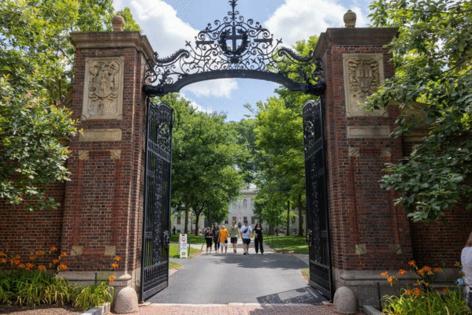Harvard ready to pay $500 million for job training in Trump deal
Published in Political News
Harvard University has signaled it’s willing to pay $500 million for workforce training programs as part of a settlement with the White House to restore more than $2 billion in frozen federal funds, according to a person familiar with the negotiations.
The administration is open to Harvard and other colleges paying penalties in the form of contributions to workforce training programs, the person said. Last month, Brown University agreed to pay $50 million over ten years for such programs in its home state of Rhode Island. Harvard has repeatedly ruled out paying a direct fine to the government, as Columbia University agreed to do.
Agreement on how to pay a penalty would bring the Ivy League university closer to ending a months-long standoff with the White House, which began over accusations that Harvard failed to confront campus antisemitism during pro-Palestinian student protests. It quickly expanded to target DEI and admissions practices, international student enrollment, and alleged faculty political bias and collaboration with China.
Harvard has pushed back, filing multiple lawsuits against the administration and publicly condemning a campaign that university President Alan Garber has called “unmoored from the law.”
Under the current terms of negotiation, Harvard’s deal doesn’t include the appointment of a federal monitor, according to the person familiar — a sticking point for the Cambridge, Massachusetts-based school, whose leaders have insisted on measures to preserve institutional autonomy throughout the negotiations. Columbia accepted an independent monitor who will oversee compliance for the next three years.
But the Trump administration will likely insist on some kind of strong enforcement mechanism for Harvard as part of a deal, according to the person, who asked not to be named in order to discuss ongoing talks.
A Harvard spokesperson declined to comment on or confirm the details. The person familiar with talks said that despite converging on the financial sum, and the idea of channeling the money to workforce programs, the parties are not near to agreeing on a final deal.
An accord along the lines being discussed underscores the extent to which the administration’s higher education agenda will squarely focus on workforce training. The White House has positioned vocational programs as a cultural and economic foil to elite universities, and called for an increase in federal money for workforce development, sometimes at the expense of traditional colleges.
In April, Donald Trump signed an executive order to “refocus young Americans on career preparation” instead of “an economically unproductive postsecondary system.” The next month, Trump wrote on Truth Social that he was considering slashing $3 billion in funding from Harvard and giving it to trade schools instead.
Inking a deal with the White House may not bring an end to all of Harvard’s problems with the administration.
Aside from suspending research funding, Trump’s team has employed a slew of techniques to pressure Harvard into accepting its demands. That includes threatening to revoke its tax-exempt status — and, just last week, to seize hundreds of millions of dollars in patents from the school.
The administration has also sought to block Harvard from enrolling international students, prompting the school to file legal challenges.
©2025 Bloomberg L.P. Visit bloomberg.com. Distributed by Tribune Content Agency, LLC.

























































Comments